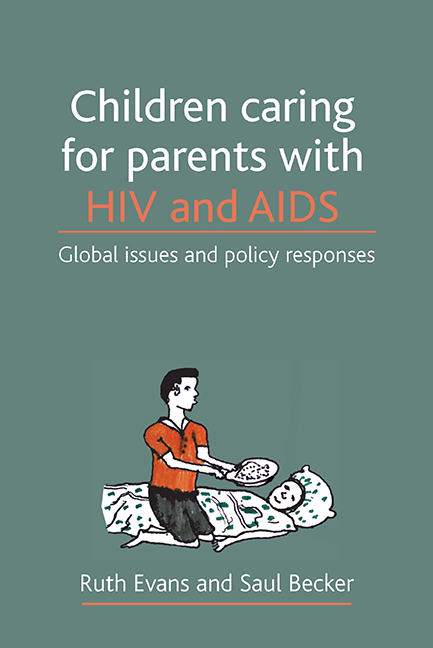Book contents
- Frontmatter
- Dedication
- Contents
- List of tables, figures and boxes
- Preface
- one Children’s and young people’s caring responsibilities within the family
- two HIV and the family
- three Reflexivity, methodology and ethics: the research process
- four Living with HIV and the effects on family life: parents’ narratives
- five Children’s and young people’s care work in households affected by HIV and AIDS
- six Resilience and impacts of care work for individual young people and their families
- seven Resilience and impacts of young people’s care work within the school and wider community
- eight The role of formal safety nets in building children’s and families’ resilience
- nine Global and local processes influencing young people’s caring roles in families affected by HIV and AIDS
- ten Responding to the support needs of children and young people caring for parents with HIV
- Bibliography
- Index
one - Children’s and young people’s caring responsibilities within the family
Published online by Cambridge University Press: 21 January 2022
- Frontmatter
- Dedication
- Contents
- List of tables, figures and boxes
- Preface
- one Children’s and young people’s caring responsibilities within the family
- two HIV and the family
- three Reflexivity, methodology and ethics: the research process
- four Living with HIV and the effects on family life: parents’ narratives
- five Children’s and young people’s care work in households affected by HIV and AIDS
- six Resilience and impacts of care work for individual young people and their families
- seven Resilience and impacts of young people’s care work within the school and wider community
- eight The role of formal safety nets in building children’s and families’ resilience
- nine Global and local processes influencing young people’s caring roles in families affected by HIV and AIDS
- ten Responding to the support needs of children and young people caring for parents with HIV
- Bibliography
- Index
Summary
Globally it is family members and communities that are usually relied upon – before state, charitable or other welfare agencies and sectors – to provide care, help, money and support to other family members who are ill, have physical impairments, mental health problems, chronic or life-limiting illnesses, or any other condition or need which requires personal intervention and assistance. The significance of the family as both an institution of welfare and for caregiving exists almost irrespective of the country's familial, social and sociopolitical structures (Jani-Le Bris, 1993), although what is expected of family members and what they must do as carers is related to the formal and informal resources available to families, as well as the sociocultural, economic and policy context that exists in that place and at that time (Millar and Warman, 1996). While there is a high degree of acceptance (and cultural legitimacy) when adults (usually women) take on unpaid caring roles, children's and young people's involvement in caring for parents and relatives in the global North and, to some extent, in the global South challenges norms of childhood and youth.
Taking global constructions of childhood and youth as our starting point, this chapter reviews the literature on childhood responsibilities, informal care and young caregiving and introduces key theoretical perspectives, such as the social construction of childhood and youth, the ethic of care, and risk and resilience discourses, which we draw on in our analyses of children's and young people's caring responsibilities in families affected by HIV/AIDS. As we demonstrate in later chapters, our comparative research between two countries (the UK and Tanzania) with very different socioeconomic and cultural characteristics and welfare systems provides insight into the global and local processes and policies influencing children's and parents’ experiences, needs and resilience in the context of HIV/AIDS.
Global constructions of childhood and youth
In Western constructions of childhood, children are not expected (or encouraged) to take on substantial or regular caregiving responsibilities. ‘Childhood’ is viewed as a ‘special’ or ‘protected’ phase, with adults, state agencies and social welfare professionals in the global North charged with safeguarding and protecting children and young people until they make the transition into ‘adulthood’ (Dearden and Becker, 2000; Frank et al, 1999).
- Type
- Chapter
- Information
- Children Caring for Parents with HIV and AIDSGlobal Issues and Policy Responses, pp. 1 - 38Publisher: Bristol University PressPrint publication year: 2009



